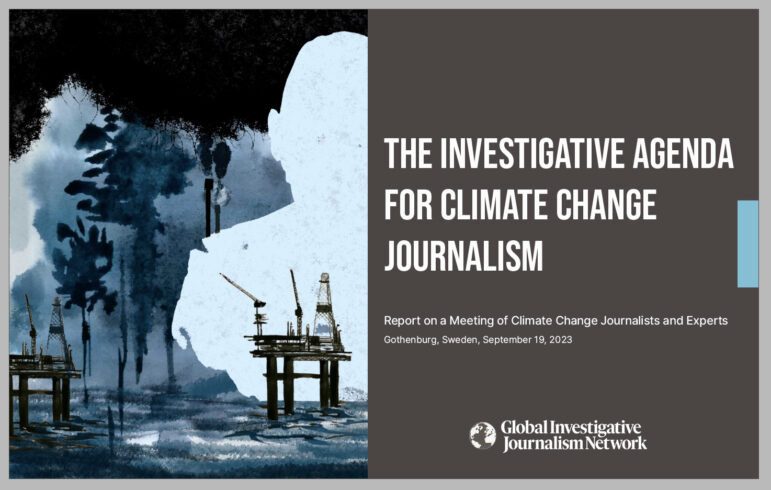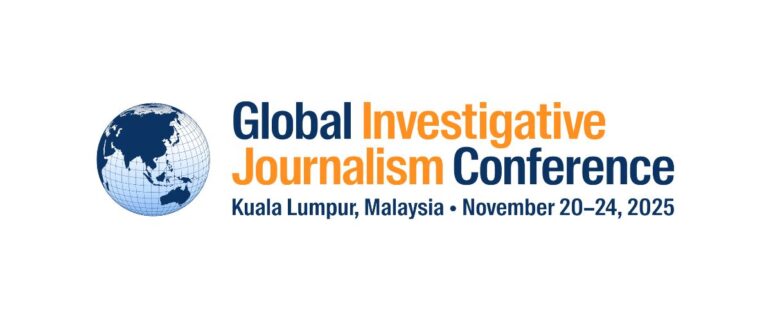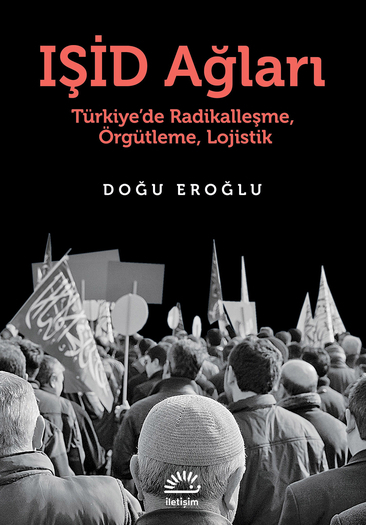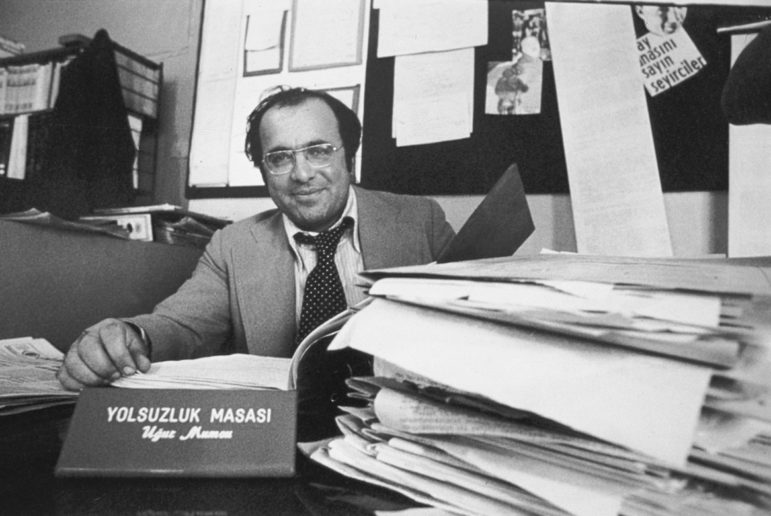

Image: GIJN
‘Obsession Is What Investigative Journalism Is Really About’: 10 Questions with Doğu Eroğlu
Read this article in
Multimedia investigative reporter Doğu Eroğlu built his reputation in Turkey not just on the stories he tells, but on how he digs them out. For more than a decade, he has pursued investigations into ISIS recruitment networks, corruption, and environmental crimes in one of the world’s most hostile climates for independent media.
Eroğlu’s 2018 book “IŞİD Ağları” (“Islamic State Networks”) mapped the radicalization pipelines that operated across Turkish cities, while his reporting has also uncovered toxic industrial waste and illegal mining practices. He was awarded an EU Investigative Journalism Prize for exposing a mass surveillance operation in which Turkish internet providers sent sensitive user data to the government’s Information and Communication Technologies Authority (BTK). His investigations into the troll armies and disinformation campaigns on social media advancing the interests of Turkey’s ruling AKP, which involved painstaking analysis of accounts and networks, traced how the governing party tries to steer debate and suppress dissent.
Eroğlu started his multi-faceted career as a reporter intern at the Ankara bureau of Cumhuriyet Daily, Turkey’s newspaper of record, in 2011, followed by a stint at Istanbul-based daily paper BirGün and producing investigative stories and videos for broadcast media platform Medyascope. He is also one of three co-founders of Ortak, an Istanbul-based independent investigative newsroom.
Eroğlu’s work is defined by his persistence and imagination. When officials block access to documents, he looks for creative ways to measure what’s happening: tracking chemical shipments to estimate mine output, or setting up cameras to count tanker trucks. For Eroğlu, the joy of journalism lies in inventing new tools of verification, pushing investigations forward step by step, and proving that evidence can still be found in dark or unexpected corners.
GIJN spoke with Eroğlu about his work digging into the reasons people joined ISIS, developing news reporting methodologies, and what keeps investigative journalism alive in Turkey.
GIJN: How did you get started in investigative journalism?
Doğu Eroğlu: I was working at BirGün when ISIS emerged in Turkey. We published some of the first serious interviews with people connected to it, and that moment shaped my path. It showed me the importance of curiosity, of going deeper than surface-level stories. It showed me the importance of investigative journalism.
From the beginning, I followed what I was personally curious about. Those stories didn’t always deliver big public reveals, but they kept me motivated. For me, journalism has always been about pursuing the unanswered questions, not just following the agenda set by authorities or the media.
GIJN: What investigation are you most proud of, and why?
DE: My favorite investigations were the ones I did on ISIS. What really excited me was trying to understand the motivations of people who joined the organization, and how those networks functioned. I wanted to know: how did they build supply lines? What did they need to do in Ankara or Istanbul to keep their operations running? What kind of meetings and connections were necessary internationally to sustain the organization? Those were the questions that drove me.
And I personally believed that would be of public interest, because even though the Turkish state has been fighting against, for example, the Kurdish insurgency and the Kurdistan Workers Party (PKK), there were no extensive studies on the motivations of the people who joined the PKK. That was disappointing. So, I wanted to contribute by looking at this issue in the context of ISIS. I thought that could be helpful if there were to be another wave of violence in the future.
Readers often expected me to prove state complicity. I couldn’t say that without evidence. What I could show were the personal and social reasons for joining. In places like Hacı Bayram in Ankara, I saw a strong sense of injustice: bad urban renewal projects, schools demolished, kids leaving education, young people drifting into petty crime or exclusion. That environment made some more willing to listen to recruiters.
It wasn’t the black-and-white story many wanted, but documenting those motivations mattered to me. Even if I couldn’t illuminate the darkest part, I could at least answer my own questions about why people took that path.
GIJN: Which investigation resonated most with readers?
DE: In 2014, I stumbled upon an unmarked hospital in Gaziantep that was treating jihadist fighters. There was no sign outside. I introduced myself as a journalist, and to my surprise, they still let me in. I ended up speaking with patients, and it turned out to be connected with al-Qaida.
I wrote about who ran it, who was treated there, and what happened to them afterwards. It wasn’t a major investigation — just being in the right place at the right time. But the public loved it. Readers liked the stories where you simply say: “This exists here, in this place.”
Personally, I prefer the stories where I’m forced to be creative and develop new documentation methods. But this showed me that sometimes a straightforward discovery can resonate the most.
GIJN: What is an example of an investigative reporting methodology that you developed?
DE: In 2019, we investigated a gold mine accused of producing far above its declared capacity. We had no access to company data, and confronting the ministry would have exposed us. So, we looked for other angles.
First, we tried speaking with the staff who handled inventory, but that didn’t work. Then we focused on sulfuric acid shipments. If you know how much acid goes in, you can estimate how much ore is being processed.
We even persuaded a friend to install a roadside camera to count the tanker trucks delivering chemicals. The plan was to collect the footage regularly and calculate production from the traffic.
In the end, our friend got scared and stopped, so the project failed. But for me, that’s the essence of investigative journalism: inventing new ways to measure what those in power try to hide, even if not every attempt succeeds.
GIJN: What unique challenges do investigative journalists face in Turkey today?
DE: The biggest problem is that there is no accountability. Officials don’t feel any obligation to answer journalists. They ignore emails, they don’t respond, and they’re not afraid of consequences — because there are none.
Companies and public institutions think: “If a journalist publishes something, I’ll just drown it in PR.” And often that works, because Turkey’s news cycle is so crowded. Every day, there is another political crisis or scandal. Even if you publish something important, it can quickly disappear in the noise.
This lack of accountability makes the public indifferent. One crisis after another, and nothing changes. People stop caring, and they stop believing that journalism can make a difference. That is one of the hardest parts of working here.
GIJN: What is your biggest personal challenge as a reporter?
DE: For me, the hardest part is access to documents. Many times, a story ends before it even begins, because we can’t find a way to document it properly. Without evidence, it risks staying anecdotal, and then I prefer not to publish at all.
That’s why starting an investigation in Turkey is so difficult. Once we are convinced that a story can be documented, then the fieldwork — going there, talking to people — is not so hard. But reaching that point is tough.
And even when we do manage to publish, the impact is unpredictable. Sometimes, nothing changes because there is no accountability. After years of this, it becomes harder to convince sources or citizens that journalism can make a difference.
GIJN: Who is a journalist you admire, and why?
DE: I was a big admirer of Bob Woodward and Carl Bernstein [who broke the Watergate story for The Washington Post]. What I admired most was their persistence. Investigative journalism is not glamorous. It means going over the same detail hundreds of times, making small changes, exhausting every angle. It’s repetitive and tiring.
What impressed me about Woodward was his refusal to give up. He would try again with a new method, make another call, follow another lead. That persistence — even obsession — is what investigative journalism is really about. You never let go until you’ve tested every possible way.
GIJN: What is the greatest mistake you’ve made and what lessons did you learn?
DE: I was in the field [covering an event] where many people had died. I made a statement I shouldn’t have — I said the death toll could be much higher than expected, based only on a few anecdotes. That was a big regret for me. It didn’t cause me trouble, and it probably [happens to] many journalists, but it really disturbed me. Because when I say something, it carries a weight. This is my profession.
The lesson I learned is clear: if information is not based on documents or evidence, I should not say it. Let others speculate. I prefer to stay silent rather than make that mistake again.
GIJN: What is your best tip for interviewing?
DE: It is important to think about the nature of the interview and the bigger project you are working on. When you are investigating logistics, like how an artifact was smuggled across a border, you ask very concrete, measurable questions. But when you want to understand motivations, the questions have to be different.
If you ask someone directly, “Why did you join ISIS?” they will try to give you the ‘right’ answer — the one they think a journalist expects. The answers sound official, clean, prepared. Instead, I ask questions that don’t have a clear right or wrong answer. I ask about their childhood, their neighborhood, what excited them, what frightened them. When people talk at that level, they stop performing. They begin to hear their own voices and give more authentic answers.
Reaching that level takes patience. You have to wait, build trust, and show people that you are not just there to use them. It is slow work, but it brings the most meaningful results.
Of course, you must also be aware of the issue of distance. When you spend too much time with people, there is a risk of getting too close, of starting to think like them. Sometimes you even begin to ask yourself: what alternatives did this person really have? The boundaries of ethics can become blurry. That’s why it is so important to manage distance carefully — to get close enough for honesty, but not so close that you lose perspective.
GIJN: What keeps you hopeful about investigative journalism?
DE: Even in Turkey, where conditions are tough, I see new experiments. We created Ortak because we realized journalists need to collaborate, not just compete. Now we’re expanding partnerships, working with more reporters, and building training programs.
It gives me hope to see younger journalists inventing new methods, and colleagues who still believe in the mission. Yes, sometimes we take on topics because they are fundable, not because they’re the most urgent. But we also keep space for the stories we believe matter most.
That balance, between survival and passion, is what keeps investigative journalism alive here. As long as we adapt, we’ll find ways to hold power accountable.
 Serdar Vardar is an investigative journalist at Deutsche Welle’s Environment Desk, specializing in cross-border environmental crimes, climate crisis coverage, corruption, and tax evasion. Winner of the EU Investigative Journalism Awards in the Western Balkans and Turkey, he has uncovered significant stories including the Qatargate scandal, Turkish corporate propaganda in the Balkans, and China’s Belt and Road environmental impacts in Peru and Colombia. Vardar has also worked on major global investigations including ICIJ’s Pandora Papers, Shadow Diplomats, and Deforestation Inc. with his work appearing in Deutsche Welle, Al Jazeera, and through collaborations with ICIJ and OCCRP.
Serdar Vardar is an investigative journalist at Deutsche Welle’s Environment Desk, specializing in cross-border environmental crimes, climate crisis coverage, corruption, and tax evasion. Winner of the EU Investigative Journalism Awards in the Western Balkans and Turkey, he has uncovered significant stories including the Qatargate scandal, Turkish corporate propaganda in the Balkans, and China’s Belt and Road environmental impacts in Peru and Colombia. Vardar has also worked on major global investigations including ICIJ’s Pandora Papers, Shadow Diplomats, and Deforestation Inc. with his work appearing in Deutsche Welle, Al Jazeera, and through collaborations with ICIJ and OCCRP.










